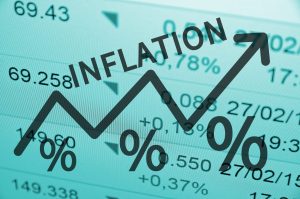
The yield on the ten-year Treasury note recently rose above 1.6%, up from 0.9% at the start of the year. Yields have spiked for two reasons, both of which are expected to result in higher inflation. First, there are expectations of a strong re-opening of our economy sooner rather than later, and second, there is massive fiscal and monetary stimulus, including last week’s $1.9 trillion American Rescue Plan. Can equities continue to rise with higher inflation? Yes, we think so.
Let’s take a look at how stocks have performed at varying levels of inflation going back to 1948:
S&P 500 Performance Based on Yr/Yr CPI: 1948-2021
|
Yr/Yr CPI RANGE |
ONE YEAR TIME HORIZON |
|
|
|
MEDIAN GAIN % |
% POSITIVE |
|
<0% |
21.6 |
90.0 |
|
0-1% |
6.5 |
65.1 |
|
1-2% |
12.9 |
80.9 |
|
2-3% |
9.3 |
79.2 |
|
3-4% |
9.0 |
70.3 |
|
4-5% |
9.9 |
68.0 |
|
5-7% |
5.1 |
62.1 |
|
7%+ |
9.8 |
71.1 |
|
|
|
|
|
ALL PERIODS |
10.2 |
74.0 |
Source: Bespoke Investment Group
The table shows that stocks perform best with either deflation (which is uncommon) or inflation in the 1-2% range (which is where we are now). The table also shows that as inflation inches higher, equity returns still perform near the long-term average of 10.2%. It is not until inflation runs hot (>5%) that median returns are significantly lower – and even then, returns are still positive.
Investors should not fear an uptick in inflation as history shows stocks are a good inflation hedge. However, inflation does have a direct impact on market leadership. Value stocks should continue to lead given higher anticipated inflation and interest rates. Growth stocks are likely to struggle under this scenario. We always hold a mix of growth and value stocks for clients, but our next purchases will continue to be value stocks.
